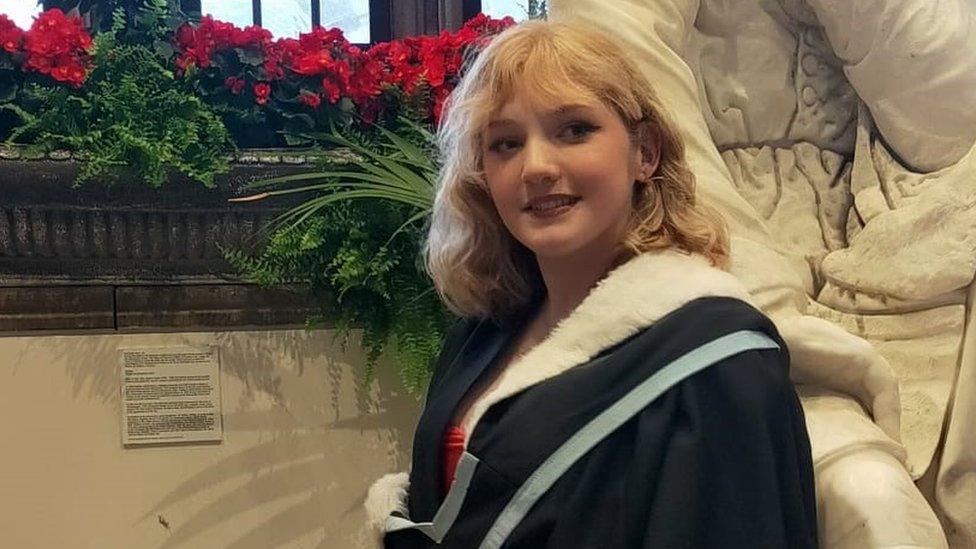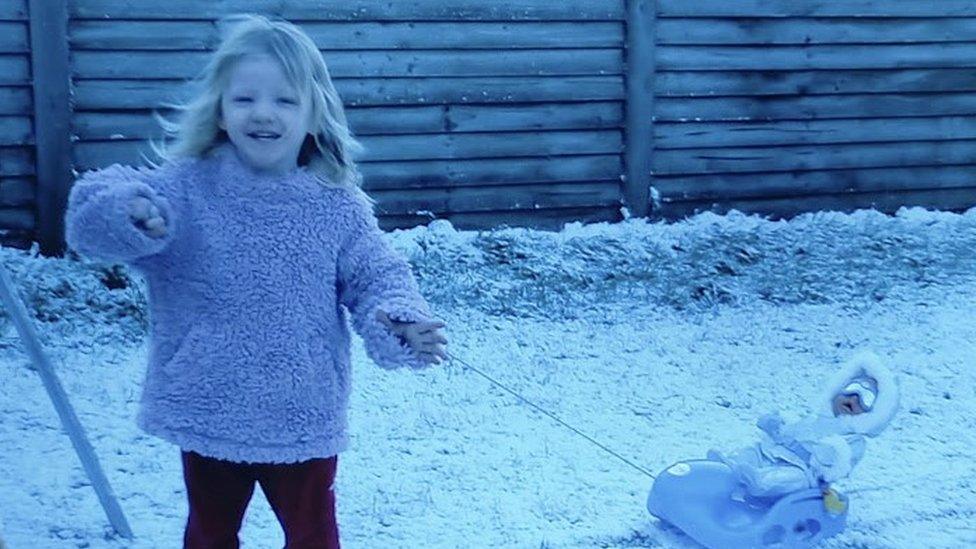Turner Syndrome: 'Be joyful' urges woman with rare condition
- Published

Lauren Campbell now works at a special needs school in Leeds
A Belfast woman who lives with a condition affecting about one in 2,000 girls has urged others to "let yourself be joyful".
Lauren Campbell was diagnosed with Turner Syndrome (TS) aged two.
The genetic condition, which can affect height and ovaries, is caused by having one normal X sex chromosome, rather than two.
Lauren said one of her biggest challenges was becoming a teenager.
"You start taking hormone therapy then, to start going through puberty," she told BBC News NI.
"This was a really hard time in my life.
"All I knew was I had TS, I knew what that meant, but I didn't quite experience that until I was a teenager, until I actually felt different from my peers," she added.
The Queen's University graduate said she has been on a journey with TS as a child, a teenager, and now as a young adult.
Lauren, now 22, explained how doctors initially misdiagnosed her condition as cerebral palsy.
She explained she was "really floppy, but that was actually just because I had a heart condition".
"Because of that diagnosis, they did lots of blood tests, and it came back that I had Turner Syndrome."
According to the most recent census data, 183 people had TS in Northern Ireland in 2021, a rise from 88 in 2011.
There are a number of potential symptoms, including being short and having fertility problems.
Data provided by the charity Turner Syndrome Support Society found an average of 75% of cases are undiagnosed.
'Improving diagnosis'
Its executive officer, Arlene Smyth, said many cases of TS get missed "mainly because most girls living with Turners look completely normal".

Lauren said she has experienced TS as a child, teenager and now a young adult
"My message to any doctor is if a mum comes to you with a short girl, especially with recurrent ear infections, you should absolutely be thinking about Turner Syndrome, rather than wait for years and years.
Ms Smyth said many people with TS "have missed out on a lot of treatment" through delays.
"So raising awareness and improving diagnosis is a vital, vital part of the society's work," she added.
Looking back, Lauren praised the love and care from relatives: "My family have been a massive support; they educated themselves in how to get me through school, to get me through university. They're my number one champions."
Following her diagnosis, she also received support from Ms Smyth's charity, which she started after her daughter was diagnosed with TS.
"We support anybody with Turner Syndrome, or their parents, or family members," she explained.
Ms Smyth added she believed information she was given at the time about the condition was "really poor and not accurate".
'Be your own advocate'
Lauren noted how the work of the society gave her the opportunity to make friends with other girls, and described it as "a great source of help and support for anyone who has received a diagnosis".
Following her teenage years, Lauren spoke about how sixth form allowed her to be more open about her condition: "Anything from my heart condition to infertility, that was when the openness really began".
"As well as through university, where I met my now partner, and having that experience of having to be very open and honest with him about having Turners," she added.
Lauren currently works at a special needs school in Leeds, and explained how her experience gave her "that empathy and extra understanding of what these students are going through, and how to be a person that is supportive of them and understands them".
In a final word, Lauren offered advice to other girls who might be struggling with Turner Syndrome: "Get to know and understand yourself, and love yourself, because you are always going to have to be your own advocate".
"Let yourself have that Turner Syndrome joy. Know yourself, ask for help, let yourself be joyful".